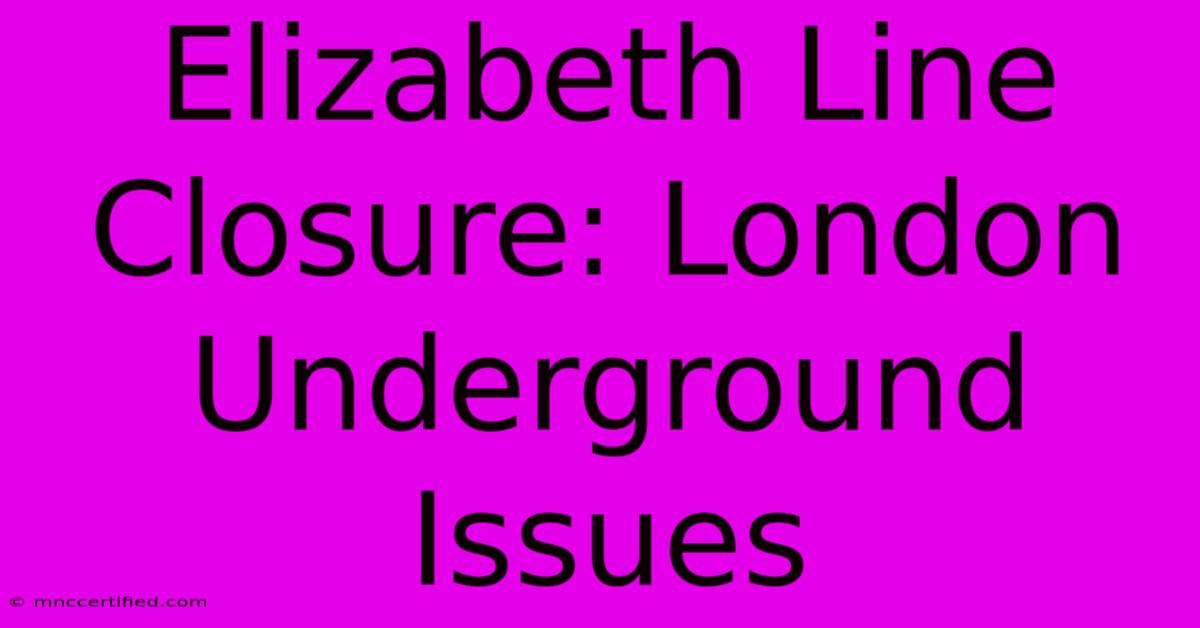Elizabeth Line Closure: London Underground Issues

Table of Contents
Elizabeth Line Closure: Navigating London Underground Issues
The Elizabeth Line, a marvel of modern engineering, has undeniably revolutionized London's transport system. However, like any large-scale infrastructure project, it's not without its challenges. Recent closures and disruptions have highlighted ongoing issues affecting the line and the wider London Underground network. This article explores these issues, offering insights into the causes, impacts, and potential solutions.
Understanding the Elizabeth Line Disruptions
While largely successful, the Elizabeth Line has experienced several closures, impacting commuters and causing significant travel disruption. These closures stem from various sources:
1. Planned Maintenance and Upgrades:
- Regular Scheduled Works: Like any complex transport system, the Elizabeth Line requires regular maintenance and upgrades to ensure its long-term functionality and safety. These planned closures, while disruptive, are crucial for preventing larger, more extensive problems down the line. Understanding the scheduling of these works and planning accordingly is key for commuters. Check the TfL website regularly for updated information.
- Signal System Issues: The sophisticated signalling system is a vital component of the Elizabeth Line's efficient operation. Any glitches or required upgrades in this system can necessitate temporary closures while repairs are undertaken. This highlights the importance of robust and reliable signalling technology in a high-capacity transport system.
2. Unforeseen Circumstances:
- Staff Shortages and Strikes: Industrial action and staff shortages can significantly impact the Elizabeth Line's operational capacity. This underscores the importance of fair labor practices and efficient workforce management within the transport sector. Staying informed about potential strikes is crucial for planning alternative routes.
- Unexpected Technical Faults: Despite rigorous testing, unforeseen technical faults can occur, leading to unexpected closures and delays. The complex nature of the Elizabeth Line's technology makes it susceptible to occasional malfunctions, emphasizing the need for ongoing monitoring and proactive maintenance.
- Third-Party Incidents: External factors, such as incidents on the tracks or nearby infrastructure, can cause delays and closures impacting the Elizabeth Line's service. These incidents highlight the interconnectedness of London's transport network and the potential for ripple effects from seemingly unrelated events.
Impact on Commuters and the Wider Network
Elizabeth Line closures have a cascading effect on the entire London Underground network. Increased passenger numbers on other lines lead to overcrowding, delays, and added stress for commuters. This highlights the need for resilient and adaptable transport planning to mitigate the impact of disruptions on the wider system.
- Overcrowding on Alternative Routes: When the Elizabeth Line is closed, commuters are forced onto alternative routes, often leading to overcrowding on already busy lines like the Central, Jubilee, and Northern lines.
- Increased Journey Times: Detours and alternative routes often result in significantly longer journey times for commuters, adding to travel stress and impacting productivity.
- Economic Consequences: Disruptions can have a knock-on effect on businesses and the economy, impacting productivity, trade, and tourism.
Mitigating Future Disruptions
To minimize the impact of future closures and disruptions, several measures can be implemented:
- Improved Communication: Clear and timely communication with commuters regarding planned and unplanned closures is essential. This involves utilizing multiple channels, including the TfL website, app, social media, and public announcements.
- Investing in Redundancy: Investing in redundant systems and infrastructure can help minimize the impact of failures. This ensures that if one system fails, others can seamlessly take over.
- Proactive Maintenance: Implementing a robust and proactive maintenance schedule can prevent many unforeseen issues and minimize the need for unscheduled closures.
- Enhanced Staff Training: Regular and thorough staff training is crucial to ensure a well-trained and efficient workforce capable of handling various situations effectively.
The Elizabeth Line's success depends on addressing these ongoing issues. Open communication, proactive maintenance, and investment in robust infrastructure are vital for ensuring a reliable and efficient service for Londoners. By acknowledging and actively addressing these challenges, Transport for London (TfL) can help minimize disruption and maximize the benefits of this crucial transport link.

Thank you for visiting our website wich cover about Elizabeth Line Closure: London Underground Issues. We hope the information provided has been useful to you. Feel free to contact us if you have any questions or need further assistance. See you next time and dont miss to bookmark.
Featured Posts
-
Landlords Petition A Second General Election
Nov 27, 2024
-
Unc Parts Ways With Coach Mack Brown
Nov 27, 2024
-
Supermarket Shortages Popular Items Missing
Nov 27, 2024
-
Live Stream Bayern Munich Vs Psg Odds
Nov 27, 2024
-
Webinar Health Equity And Social Protection
Nov 27, 2024